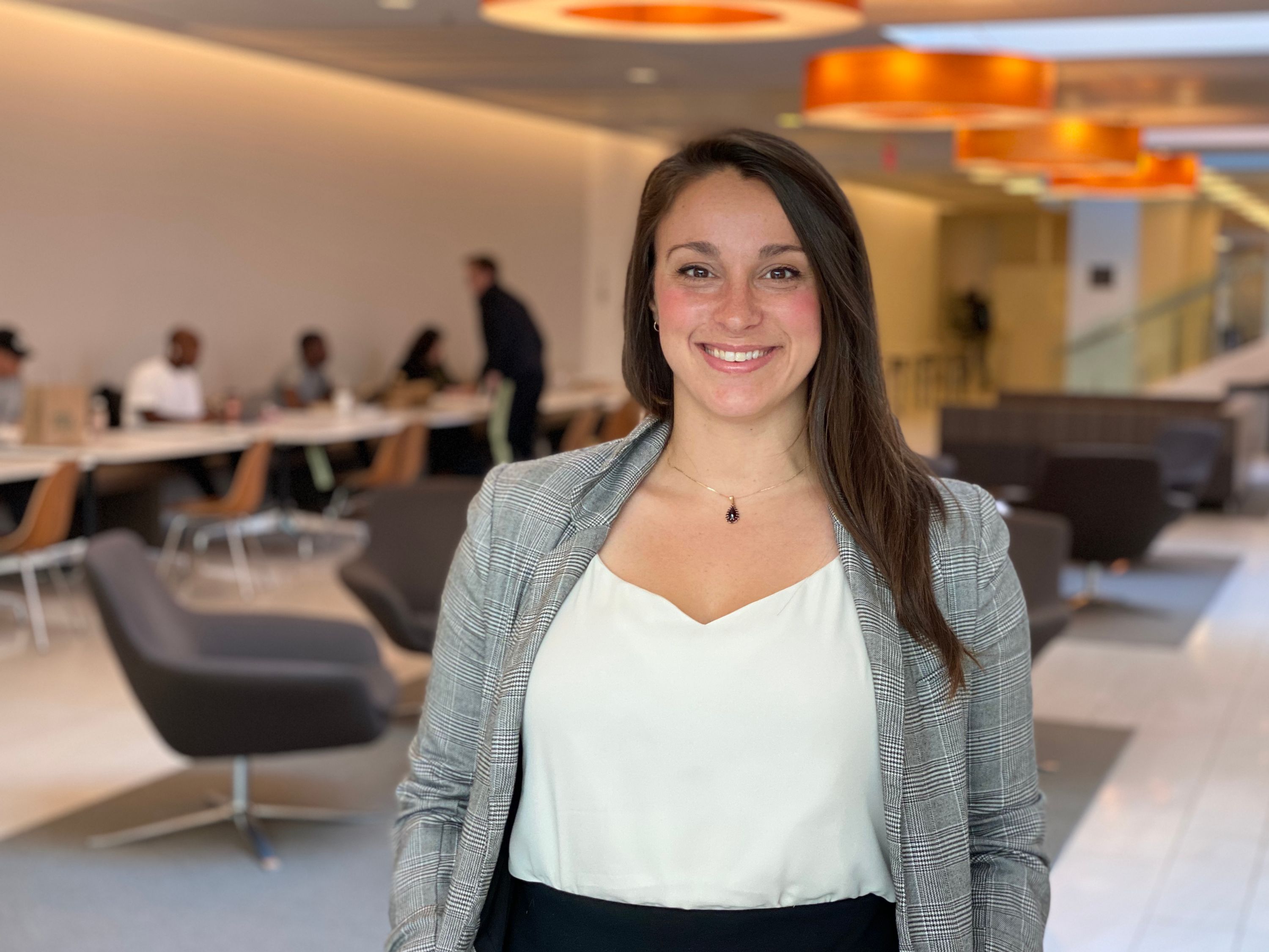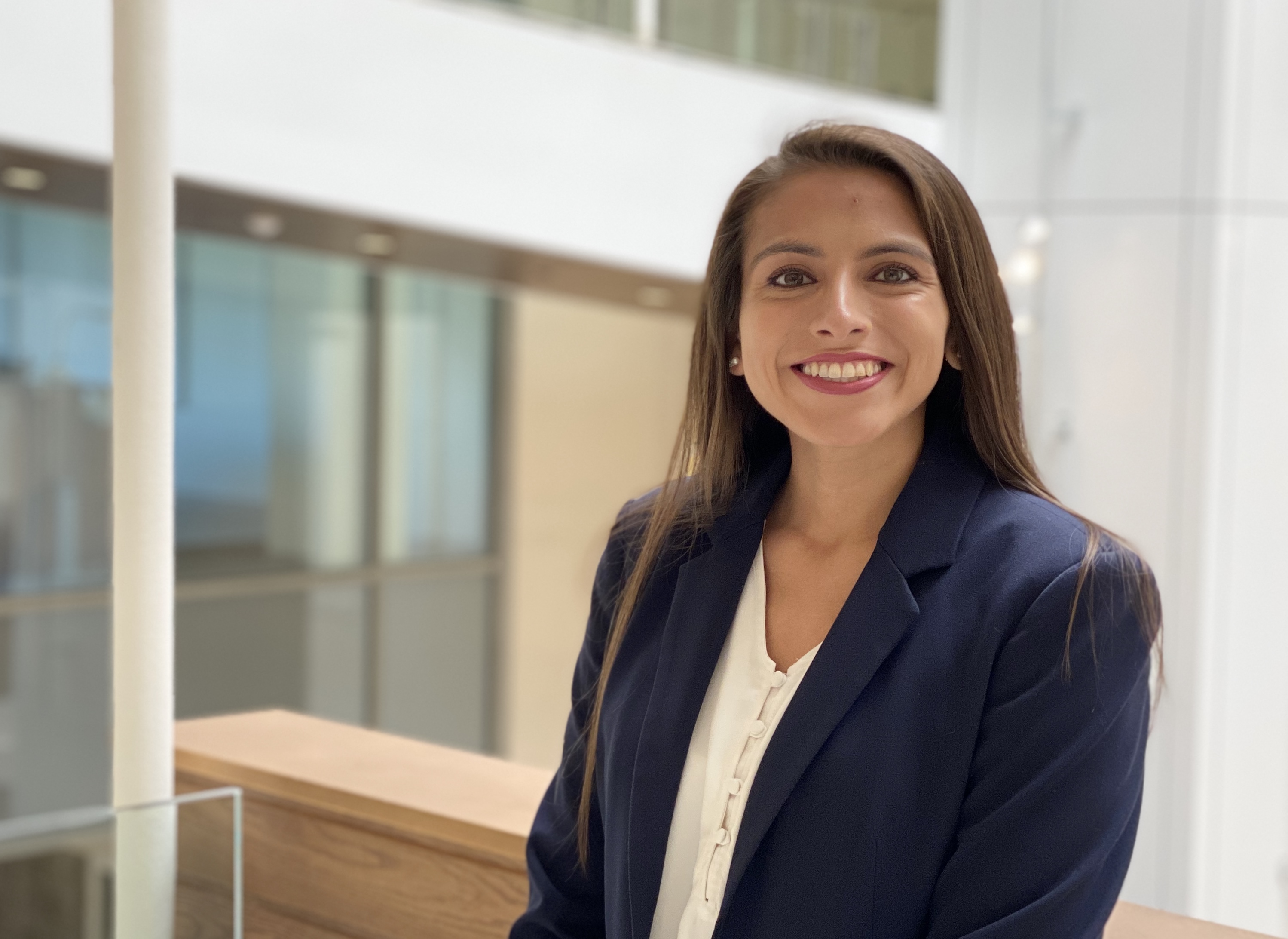Myers Scholarship Breaks Down Barriers for Two AUWCL Students
Nov. 26, 2019
Two students at American University Washington College of Law, 2L Lauren LaVare and 3L Ericka Cruz, have been chosen as recipients of the 2019-20 Myers Law Scholarship.
The Myers Law Scholarship, AUWCL’s most prestigious donor award, provides one-year scholarships to full-time JD students who show academic promise and performance and demonstrate financial need. Scholarships are funded up to 125 percent of tuition.
“Ericka and Lauren have already made tremendous strides toward their professional aspirations, and I am thrilled that the Myers Scholarship will assist them in continuing their legal journey,” said Dean Camille Nelson. “The scholarship is a perfect example of how philanthropy can have a profound impact on the lives of our students.”
LaVare and Cruz were chosen by an AUWCL faculty selection committee from a pool of nearly 50 applicants.
Lauren LaVare
“It was a little bit of disbelief. But once it sunk in, I was very humbled and grateful about how much the Myers Scholarship would change my future and opportunities to continue to pursue public interest,” LaVare said. “People will say ‘you may want to take a high paying job first to pay off your debt,’ and then eventually come back to what you really care about. That felt sad and draining to have to give up figuring out how to use the law to empower people and reduce barriers, just because you’re facing your own.”

As a Peace Corps volunteer in Malawi from 2012-14, LaVare taught in secondary schools and worked with teachers to decrease gender-based violence by reporting incidents and following procedures to not re-victimize students. But law enforcement and the legal system in Malawi did little to support LaVare’s efforts, she said.
“Even when I came back home, I saw the barriers nonprofits and NGOs faced if the legal system wasn’t there to support them. I felt like I needed to be on the legal side, to have the power to open doors to make sure people were not re-victimized.”
LaVare’s passion and legal path came full-circle her 1L year at AUWCL, when she re-connected with High Court Justice of Malawi Fiona Mwale, who she had met during her time in Peace Corps. Justice Mwale was in D.C. as a Humphrey Fellow at AUWCL, and invited LaVare back to Malawi to work as a judicial law clerk. There, she helped draft over 20 opinions for judicial review on civil and criminal litigation cases, including issues on negligence, divorce, child custody, homicide indictments, and criminal appeals.
Along with being a junior staff member of American University Law Review, LaVare is also a member of the Kovler Project Against Torture (KPAT) and participated in the United Nations Convention Against Torture.
“It’s a once in a lifetime opportunity, to work directly with members of the Convention,” LaVare said. “It was so amazing to learn directly from Professor Grossman, and was such an inspiring honor to work with a team of talented WCL students who will leave an impact of good on the world. The ability to do research to support the U.N., and then the ability to go to Geneva and see it all in action. It helps to define what your own career might look like, and show you what your own impact could be. ”
Ericka Cruz
Cruz came to AUWCL knowing she wanted to do immigration law. She serves as a student attorney in the Immigrant Justice Clinic and as president of the Latinx American Law Students Association, has clerked for immigration law firm Fragomen, and interned at CASA De Maryland, Ayuda, and the American Immigration Council.
But as time went on, the realities of school debt, returning to her hometown of New York City, and working in her chosen field gave Cruz concern.

“I didn’t know if working with and for immigrants and having that type of career would be realistic, which was kind of disheartening, because all of the work that I’ve done here had been so exciting and I knew immigration law was what I wanted to do,” Cruz said. “The [Myers Scholarship] is allowing me to reset, and reassess what my options look like. It’s given me the reassurance that, should I choose this career, at least the debt isn’t overwhelming and I can support both my family and myself moving forward post-grad.”
The daughter of two immigrants who came to U.S. as young adults without college degrees, Cruz said education changed the trajectory of her life, and wants to help change the lives of others. Prior coming to law school, Cruz did Teach for America. It was this overlap between immigrant students and education, and the obstacles they face, that propelled her into a law. As a student attorney in AUWCL’s brand new AU DREAM Initiative, Cruz helps both documented and undocumented college students in the DMV area with humanitarian immigration-based needs, including DACA renewal.
Cruz also had the opportunity to get back in the classroom as a teaching fellow her 2L year with the Marshall-Brennan Constitutional Literacy Project, a nationally recognized law-related education program that promotes democratic engagement, constitutional literacy, and legal advocacy among high school students.
“I missed being in classrooms with students who looked like me, who come from similar backgrounds. I wanted the students to see I’m in law school—something that never seemed possible where I’m from—to show them they could do it, too,” she said.
Looking Toward the Future
Cruz said her five year plan includes practicing immigration law in New York City, and giving back to others the way so many have given to her.
“I didn’t know any Latino lawyers before law school. Coming to AUWCL and meeting Latino professors, who are also lawyers, was mind boggling,” Cruz said. “I have had the help of a village and half to get here, and mentors have played a very important role, and I’d like to pay that forward.”
Her 10 year plan, she said, is to start a Marshall-Brennan program at a law school in New York City.
When LaVare graduates, she hopes to work in one of the growing number of progressive prosecutors’ offices across the country.
“For me, it’s important to focus on litigation for compassion and empathy, rather than increasing the number of people in prison,” she said. “I want to grow that skillset to take it on a bigger scale, and work abroad in either strategic litigation or rule of law, helping other countries establish safe, fair, and compassionate justice systems.”